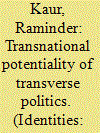| Srl | Item |
| 1 |
ID:
126166


|
|
|
|
|
| Publication |
2013.
|
| Summary/Abstract |
In this article I consider the interface between state policy and popular culture by examining the issue of nuclear weapons in and around Indian popular cinema. Whilst it has been pointed out that there are no cinematic examples of nuclear annihilation in Indian film, I propose instead that the threat of it is nevertheless evident. Nuclear technology is deeply entangled in anxieties about the nation, its constituents such as the family, and its detractors such as forces to do with communalism and separatism. These disquieting dynamics do not enable a straightforward alliance between the nuclear and the national as official state discourse would have it, where nuclear weapons are advocated as a measure of India's military might in the contemporary era, or in other words, 'nuclear nationalism'. Rather than being nation-builders, films present nuclear weapons as dangerous nation-destroyers, for missiles harbour threats to people and civilisations especially in the hands of the figurative terrorist and those with designs against the nation of India. With this formulation there lies a latent critique of state policy, which nevertheless is imbued with patriotic rhetoric by the end of the film, when the hero averts disaster and/or invokes the state as the paragon of nuclear management.
|
|
|
|
|
|
|
|
|
|
|
|
|
|
|
|
| 2 |
ID:
116579


|
|
|
|
|
| Publication |
2012.
|
| Summary/Abstract |
How can we conceive of global studies of culture and power without (i) overlooking the parameters of the nation state as a forceful axis of power, (ii) prioritising the West as the fount of energised political directives and (iii) reinforcing neo-liberal assumptions on culture and subjectivities? With a reappraisal of theories of globalisation, I elaborate on a transverse politics for transnational studies. I suggest that the national need be foregrounded in any appraisal of the power-laden axes in the co-constitution of the local and the global. Too often, the 'national' is all too easily contracted into the 'local'. I also revisit earlier works to propose multi-sited, engaged and transversal studies that do not simply follow and track global flows but question and undermine their hegemonic trails.
|
|
|
|
|
|
|
|
|
|
|
|
|
|
|
|